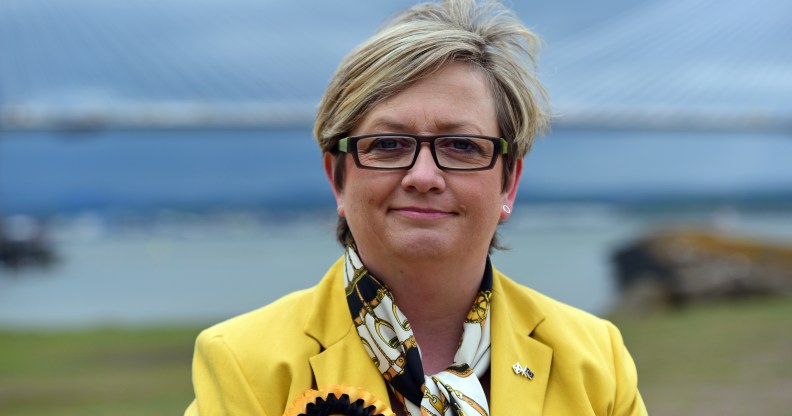Women ‘close to quitting’ SNP over plans to reform gender recognition laws in Scotland

SNP MP Joanna Cherry spoke on a panel at the meeting launching the women’s pledge. Cherry pictured here in 2017. (Ken Jack – Corbis/Corbis via Getty Images)
A private meeting of Scottish National Party (SNP) MPs has heard from women who say they are close to quitting the party over plans to reform gender recognition laws in Scotland.
The comments were made at the launch of the SNP’s women’s pledge, which calls for women to have the right to discuss gender recognition policies.
Rhona Hotchkiss, the former governor of Cornton Vale women’s prison, said she was close to quitting the SNP because of what she considers a refusal to address concerns that reforming gender recognition laws could mean women and girls are vulnerable to attacks by predatory men in single-sex spaces.
Hotchkiss said that the meeting, attended by around 60 people, had made her optimistic.
“I think this will have an impact because we’re the first political party to come out saying women have the right to discuss these issues without being threatened or abused. This has stopped me from leaving the party. When you see a group of people together like this it gives me hope,” Hotchkiss said.
The women’s pledge, which has been signed online by almost 2,000 people, says: “Women have the right to discuss policies which affect them, such as the proposed self identification of sex, without being abused or silenced.”
Speaking on a panel at the event, SNP MP Joanna Cherry said she had faced online abuse for raising these concerns, although the criticism had come from “a small minority of people”.
“There are serious questions about how we develop policy in the SNP and how we conduct debate,” Cherry said. “It’s important to disagree – we could do with more disagreement at times – but it has to be respectful.”
Nicola Sturgeon has previously said she does not see “the greater recognition of transgender rights as a threat to me as a woman or to my feminism”.
The Scottish government postponed plans to reform the gender recognition act in June, pending further public consultation.
LGBT+ rights groups point to this as evidence of the Scottish government’s commitment to consult widely on any changes to gender recognition laws.
The proposed changes would streamline the way that trans people apply for a gender recognition certificate, which is the mechanism by which trans people can change the legal gender on their birth certificates.
Advocates for the reforms have repeatedly pointed out that this would mean changing legal gender is less expensive, less bureaucratic and less intrusive than the current process, which forces trans people to provide medical evidence and be diagnosed with gender dysphoria.
The second consultation on proposed changes is due to be held soon, with a report called the “Equality Impact Assessment” – which could cover the points raised by the women’s pledge – due to be published alongside the bill.

